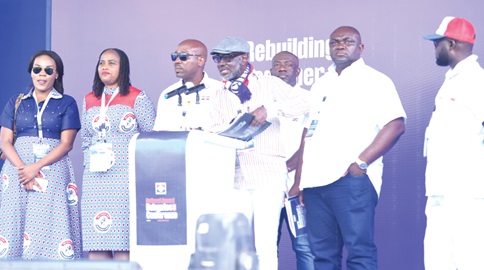adverts
NPP Expands Electoral College by 40%, Adds 60,000 New Delegates to Surpass 280,000 Voters for 2026 Flagbearer Race
The New Patriotic Party (NPP) has voted to expand its electoral college by 40%, introducing significant constitutional reforms during an extraordinary national delegates conference held in Accra on Saturday, July 13, 2025.
In a landmark decision, delegates approved the inclusion of over 60,000 polling station executives into the party’s electoral college, increasing its size from approximately 220,000 to more than 280,000. This move is widely seen as a major step towards broadening internal party democracy and inclusivity.
Under the new structure, former Members of Parliament (MPs), former parliamentary candidates, former Metropolitan, Municipal, and District Chief Executives (MMDCEs), card-holding former ministers and deputy ministers, and former regional, constituency, and branch executives will now be eligible to vote in the upcoming flag bearer election slated for January 2026.
adverts
However, polling station, constituency, and regional executives whose tenure ends in March 2026 will not take part in the 2026 presidential primaries, as their positions will only be re-elected after that period.
The reforms also saw the decoupling of the role of officer-in-charge of elections or research at the constituency and regional levels. Instead, two distinct positions will now be created—one for elections and another for research—aimed at streamlining the electoral process and reinforcing accountability.
In a bold shift, the party has scrapped its long-standing tradition of holding a special delegates conference to shortlist flag bearer aspirants. All aspirants, regardless of number, will now contest directly in the main election. This change eliminates the practice that previously narrowed the race to the top five contenders.
These reforms were part of 56 proposed constitutional amendments, of which 54 were adopted via voice vote. Delegates enthusiastically shouted “YES” in favour of the approved motions, while only two—including one to reduce the youth age limit from 40 to 35—were rejected.
The secretary of the NPP Constitution Review Committee, Iddi Muhayu-Deen, hailed the amendments as crucial for strengthening the party’s internal governance and promoting broader participation. “This will set the stage for the upcoming presidential primaries next year, ensuring a more inclusive and representative electoral process within the party,” he noted.
He also revealed that the party is working towards transitioning to a one-member, one-vote system, with full implementation planned for the 2028 general elections. This ambitious reform will further democratise the party’s internal elections.
Former NPP National Chairman Peter Mac Manu, a strong advocate for removing the clause mandating a special delegates conference, expressed satisfaction with the outcome. He emphasised that the decisions would be compiled and used to draft an amended party constitution, to be signed by the National Chairman and General Secretary and submitted to the Electoral Commission.
“The conference was very successful. We are compiling the accepted motions, and the amended constitution will soon be made official and distributed,” Mr. Mac Manu confirmed.
Other prominent members of the party also praised the reforms. Former Northern Regional Minister Salifu Saeed said the changes would consolidate the NPP’s democratic structures and potentially serve as a model for other political parties.
He applauded the inclusion of former party executives and public officials in the Electoral College, saying it reflects the party’s broad-based nature and commitment to rebuilding public trust after the 2024 electoral defeat.
Former Mion MP Musah Abdul-Aziz Ayaba welcomed the decision to retain the existing youth age limit and rallied support for the party’s renewed vision toward reclaiming power in 2028. He also praised the inclusion of former MPs in the voting bloc, saying their experience will enrich the selection process.
Background to the Reforms
The constitutional amendments stem from the work of a nine-member Constitution Amendment Committee chaired by Frank Davies. Other members included MPs Patricia Appiagyei and Kojo Oppong Nkrumah, Deputy General Secretary Dr. Antoinette Tsiboe-Darko, and legal and medical professionals, among others.
Their mandate was to review the party’s constitution in line with recommendations from the Mike Oquaye Election Review Committee and the 2021 Constitutional Review Committee, led by Alexander Afenyo-Markin. The team was tasked with organising and categorising proposals to streamline debates and ensure clarity in the amendment process.
Following the conference, the committee will now begin integrating the approved motions into the official party constitution, laying the groundwork for the 2026 flag bearer election and the party’s long-term internal reforms.
The reforms mark a turning point for the NPP as it seeks to renew itself following its loss in the 2024 general election. With the enlarged electoral college and removal of procedural bottlenecks, the party aims to energise its base, improve transparency, and build momentum for a strong comeback in 2028.
Click the link Puretvonline.com | WhatsApp Channel to join the WhatsApp channel
GOT A STORY?
Contact/WhatsApp: +233243201960 or Email: manuelnkansah33@gmail.com


